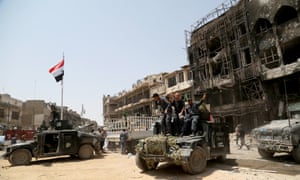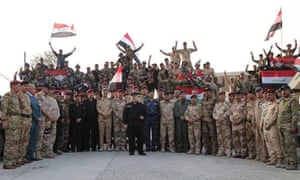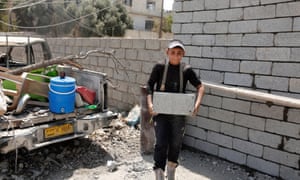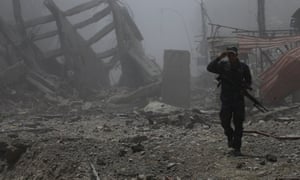'We lost our houses, our cars, our men': call to protect Mosul civilians | World news
Mosul’s civilians remain at grave risk and have endured a catastrophic ordeal, human rights organisations have said as they urge the Iraqi government to take steps to protect innocent people and investigate large-scale civilian deaths in the city.
The calls by aid workers and human rights activists came as Iraqi troops fought to reclaim a final sliver of territory controlled by Islamic State in the city where the extremist group’s leader, Abu Bakr al-Baghdadi, proclaimed his “caliphate†three years ago.
“The horrors that the people of Mosul have witnessed and the disregard for human life by all parties to this conflict must not go unpunished,†said Lynn Maalouf, research director for Amnesty International in the Middle East.
“Entire families have been wiped out, many of whom are still buried under the rubble today. The people of Mosul deserve to know, from their government, that there will be justice and reparation so that the harrowing impact of this operation is duly addressed.â€

The Iraqi prime minister, Haider al-Abadi, declared victory in Mosul on Sunday, ten months into a campaign to oust the terror group from the most densely populated city under its control. On Monday he said that victory marked “the failure and the collapse of the terrorist stateâ€.
The defeat leaves Isis without any major urban strongholds in Iraq, retreating to its insurgent roots in the desert after a spectacular fall from a zenith in which it controlled vast stretches of Syria and Iraq.
The liberation of Mosul has refocused attention on the plight of the city’s civilians, thousands of whom are now displaced and will likely remain as internal refugees for months while the city is rebuilt, in the scorching heat of Iraq’s summer. The militants have used them as human shields in their effort to resist the military’s advance, and scores are believed to have been killed as a result of airstrikes by the US-led coalition that is backing the Iraqi army.
Many are likely to be vetted to determine whether they have links to Isis or cooperated with the group, a process that in the past has led to arbitrary disappearances, though Iraqi officials have repeatedly vowed to prevent extrajudicial retribution.
The UN’s human rights chief urged Iraq’s government to ensure that human rights will be respected. Speaking on Tuesday, Zeid Ra’ad al-Hussein said Mosul’s fall was a “turning point†in the conflict against Isis, but warned the group continues to subject people to “daily horrors†in its remaining strongholds such as Tal Afar and Hawijah. As “horrific†as the crimes of Isis are, he said there is “no place for vengeanceâ€.

Melany Markham, a spokeswoman for the Norwegian Refugee Council, who is on the ground near Mosul, said: “The closer you are to the front line in west Mosul, the greater the need and the harder it is to meet those needs. Most of the people living there have been under siege for months without food, water or medical supplies. Their situation is desperate, yet the conflict is preventing us from reaching these people.â€
Markham said the Iraqi government and the US-led coalition were now responsible for protecting Iraqi civilians “who have been let down time and time again†with aid as well as reconstruction projects and justice for their suffering.
Humanitarian workers said refugees were suffering in the camps that had been set up, lacking sufficient food, water and electricity to survive the scorching desert heat.
Salih Mohammad, from western Mosul, who is staying at a refugee camp near the city, said he could not go back to the city because there were no services and much of his neighbourhood was destroyed in the fighting.
“Two of my brothers are missing ... and I don’t know if they are alive or not,†the 36-year-old said. “My house was destroyed in the fighting and we came here last week. There is no security in Mosul now because even in the east of the city, there are still Daesh [Isis] sleeper cells and they occasionally strike.â€
Hafsa, a 40-year old, also from west Mosul, is living in a camp with her eight children. She said several of her relatives were missing.

“We lost everything: our houses, our cars, our men,†she said. “I am not going back to Mosul anytime soon There is no life there, everything is flattened in west Mosul. Life in the camp is not ideal but there is peace and no one make any threats against you and extorts from you. The future of Mosul is in the hands of people and the government, and they need to work together if they want to improve life in Mosul.â€
A report published on Tuesday by Amnesty International urged the creation of an independent commission to investigate the killing of civilians by all sides in the conflict, including British forces that took part in the bombing campaign.
The report documents 45 attacks that killed at least 426 civilians, and argues that Isis used human shields but that the coalition failed to adapt its tactics and continued to use imprecise weapons with wide area effects in the densely populated city.

“The scale and gravity of the loss of civilian lives during the military operation to retake Mosul must immediately be publicly acknowledged at the highest levels of government in Iraq and states that are part of the US-led coalition,†Amnesty said.
The UK has conducted more than 700 airstrikes as part of the Mosul operation, and the rights watchdog said the Ministry of Defence should set up a proper commission to investigate the claims of civilian casualties.
“While there may be an end to military conflict in Mosul, there is still no end in sight to the humanitarian crisis,†the UN High Commission for Refugees said in a statement, adding that hundreds of thousands of people have been displaced by the fighting.
“Many have nothing to go back to, due to extensive damage caused during the conflict, while key basic services, such as water, electricity and other key infrastructure, including schools and hospitals, will need to be rebuilt or repaired.â€
UN envoy opens seventh round of talks in Syria
The UN’s envoy for Syria said that the stars may just be beginning to align for peace after six years of savage conflict, as he opened a new round of indirect talks, the seventh so far, between Syrian government representatives and opposition leaders on Monday.
Staffan de Mistura ruled out any breakthrough at this week’s negotiations in Geneva to end a war that has claimed more than 320,000 lives and displaced more than half of Syria’s population.
But he pointed to a new ceasefire brokered with US and Russian help, covering three provinces in southern Syria, as one source of hope.
He said other hopeful signs were the creation of “de-escalation zones†elsewhere and the recapture of Mosul by Iraqi forces from Islamic State, whose geographic spread had become a prime ingredient in Syria’s combustible mix.
“There is a higher potential than we have seen in the past for progress,†the UN envoy told a news conference after the first day of the talks, which he is chairing, alternating between meeting Syrian government delegates and representatives of three opposition groups.
Disappointment has come all too often as various peace initiatives came to naught since a revolt first erupted against President Bashar al-Assad in March 2011, the Swedish-Italian diplomat conceded.
“But what I can tell you is that we are seeing several stars coinciding in a certain direction, both on the ground, regionally and internationally.†Agence France-Presse in Geneva

0 Response to "'We lost our houses, our cars, our men': call to protect Mosul civilians | World news"
Posting Komentar